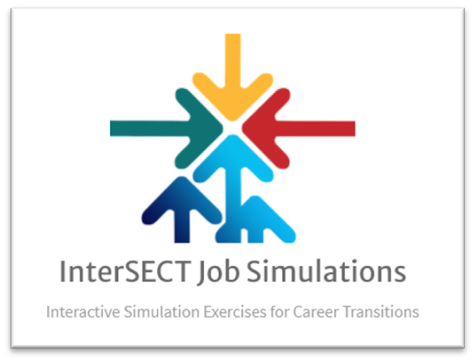
Imagine this: you just started thinking about your future career, and hope to find out information about careers you are interested in, or you feel stuck in a career that you are not satisfied with, and want to give a try in another job. No matter which situation you are in, the first few things you may want to know is what your jobs of interest look like, what skills are required, whether you would really enjoy doing work associated with the career and whether you would really like to invest your time and efforts in it.
To answer those questions, the online platform InterSECT Job Simulations might be able to help by providing you with the background and resources of different career options in the form of simulations. InterSECT enables you to consider your career interests and skills, and ways to translate them to potential careers before you decide to go out and gain additional training and experience in the field.
(Photo courtesy of InterSECT)
Free and tailor-made to doctoral level job seekers
As a free platform under Creative Common License, InterSECT is designed for PhD job seekers from disciplines within the sciences and humanities. It covers a wide range of career fields, from industry, academia, and government sectors. If you are from a science-related program, you will find the fields exclusively relevant to science on the Science Sims page, for example, clinical trial, medical writing, intellectual property, research development, etc. For humanists, the Humanities Sims page will lead you to fields like consulting, training, translation, and research and analysis. There are also some common fields shared by both science and humanity degree holders, such as writing and editing, entrepreneurship, university administration, and policy and advocacy.
Guided simulation in simple steps

(Photo courtesy of InterSECT)
If you have a few career choices in mind that you want to explore, start from the self-guided job simulation activity in InterSECT. You will first learn about the background of a specific job, for example, the job nature, daily tasks involved, and required skills, etc. Then, you will complete an exercise that is a real-life task for which professionals in that position are responsible. Through the simulation exercise, you can visualize and experience work that you would likely do in the career field of interest. Each task in the simulation exercise takes approximately one hour to complete.
To keep track of your progress like a professional, InterSECT suggests you set up your SMART goals (Specific, Measurable, Action-Oriented, Realistic, and Time-Bound) in a timeline that is manageable to you. A template of a checklist is available for you to get started.
After completing all tasks in the simulation exercise, you can reflect upon the job simulation tasks and decide whether you want to explore that career in depth. At this stage, you will ask yourself a list of questions provided in the self-reflection guide. Doing this reflection activity, you can identify the things you learn about the career, assess the aspects you like or dislike about the job tasks, and use the job simulation experience for deciding if further investigation in the career is needed. InterSECT suggests reviewing the self-reflection questions before starting the job simulation tasks.
Lastly, InterSECT strongly encourages you to seek out a professional in the specific career field of your interest, and share your job simulation experience and discuss questions you came across. A practical guide is provided to navigate this process, from channels to connect with professionals to sample questions for the chat. You will find a handful of useful tips and information in this guide, such as email templates for reaching out to and thanking the professionals.
Benefits of trying a job simulation
By engaging in a simulation, you have an example of a project that you have completed relevant to future work in a potential field of interest. You will not only increase your knowledge about the field but also have the experience of grappling with a real-life task. If you have a chance to meet with professionals or potential employers in the field, it would be worth sharing and demonstrating what you know about the job from your simulation experience.
Another benefit is that without committing to a full-blown internship you can experience a bit of what the work is like, related to a career of interest. Through a job simulation and guided self-reflection, you are better able to then determine where to focus efforts for a future internship and/or job search.
If you have no idea what career options interest you, InterSECT could still be a great assistant that provides a background of each field and/or occupation through each job simulation.
To engage in the self-guided simulation tasks, you could partner with a friend and try out different simulations together, exchanging your experiences and reflections after each task. You could also work with a career consultant to identify your interest and strength through the simulations and set up your career goals.
(Cover photo courtesy of Pixabay)
